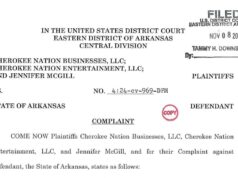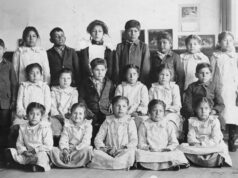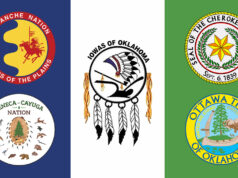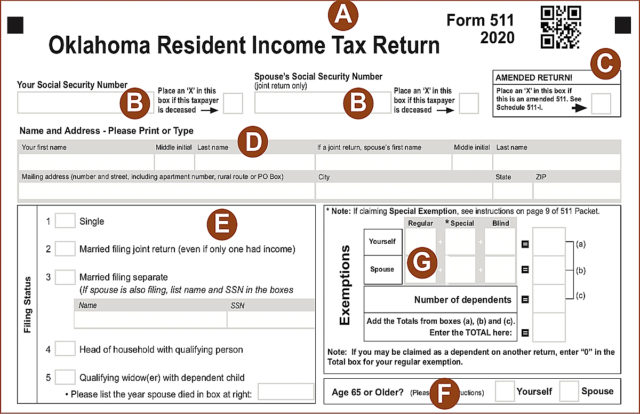

Since the July 2020 U.S. Supreme Court ruling in McGirt v. Oklahoma, more than 5,000 people have filed official challenges of their state income tax obligations by citing a section of state code that says tribal citizens are exempt from income tax if they live and work on their tribe’s Indian Country reservation.
None of the tax protests have been approved, according to Oklahoma Tax Commission officials, despite the fact that the exemption is explicitly established under Oklahoma Administrative Code and in a 1993 U.S. Supreme Court case.
The situation underscores the ongoing attempts by Oklahoma Gov. Kevin Stitt’s administration to restrain the McGirt decision’s impact to criminal jurisdiction only and not civil jurisdiction.
“The scope of the McGirt decision is expressly limited to federal major crimes,” said Ryan Leonard, Stitt’s special counsel on tribal jurisdiction issues. “The state will continue to exercise its rightful jurisdiction within the McGirt-affected areas, including to collect taxes, which provide critical services that benefit all Oklahomans.”
Among others, tax attorneys representing tribal citizens and Cherokee Nation Principal Chief Chuck Hoskin Jr. disagree.
“There’s nothing new about the law out there on the ability of a state to tax a member of a federally recognized tribe on a reservation. What’s new, of course, is the scope of the reservation (because) of the McGirt case,” Hoskin said during an Oct. 27 panel discussion hosted by the Oklahoma Policy Institute. “So, we can look to existing law, and we can see that taxation doesn’t attach to individual Native Americans who live on reservations.”
Hoskin’s statement is supported by Section 710:50-15-2 of the Oklahoma Administrative Code, which reads:
The income of an enrolled member of a federally recognized Indian tribe shall be exempt from Oklahoma individual income tax when (…) the member is living within “Indian Country” under the jurisdiction of the tribe to which the member belongs; and, the income is earned from sources within “Indian Country” under the jurisdiction of the tribe to which the member belongs (…).
Leonard and the state, however, argue that civil jurisdiction issues such as taxation authority were never litigated in the McGirt v. Oklahoma case. The majority opinion, for instance, begins with the statement, “Held: For [Major Crimes Act] purposes, land reserved for the Creek Nation since the 19th century remains ‘Indian Country.'”
Leonard said questions about the state’s ability to collect taxes from tribal citizens residing on reservation land speak to the “jurisdictional uncertainty created by the decision,” which the Stitt administration is now asking the U.S. Supreme Court to modify or overturn.
“The position of some who argue McGirt calls into question the state’s ability to collect taxes, a fundamental function upon which the state’s very existence relies, is only further evidence of the unacceptable jurisdictional uncertainty created by the decision,” Leonard said. “It is incumbent upon all Oklahomans to pay their fair share, including when it comes to income and sales taxes.”
Oklahoma Tax Commission officials echoed the same sentiment as Leonard.
“The OTC has consistently maintained its position that McGirt applies only to criminal matters,” said Cassandra Sweetman, public information and press liaison for the Oklahoma Tax Commission. “In excess of 5,000 individual income tax returns have been filed claiming the tribal income exclusion following the McGirt decision. While this represents an increase in such claims over prior years, it is not possible for the OTC to determine which of those claims were made as a direct result of McGirt.”
Sweetman said the Tax Commission does not have data regarding how many of those 5,000-plus claims have been denied. If a citizen’s tribal income exclusion filing is denied by the OTC, the taxpayer may then file a protest.
“Approximately 100 protests are currently pending before an administrative law judge,” Sweetman said.
Background on income tax exemption for tribal citizens
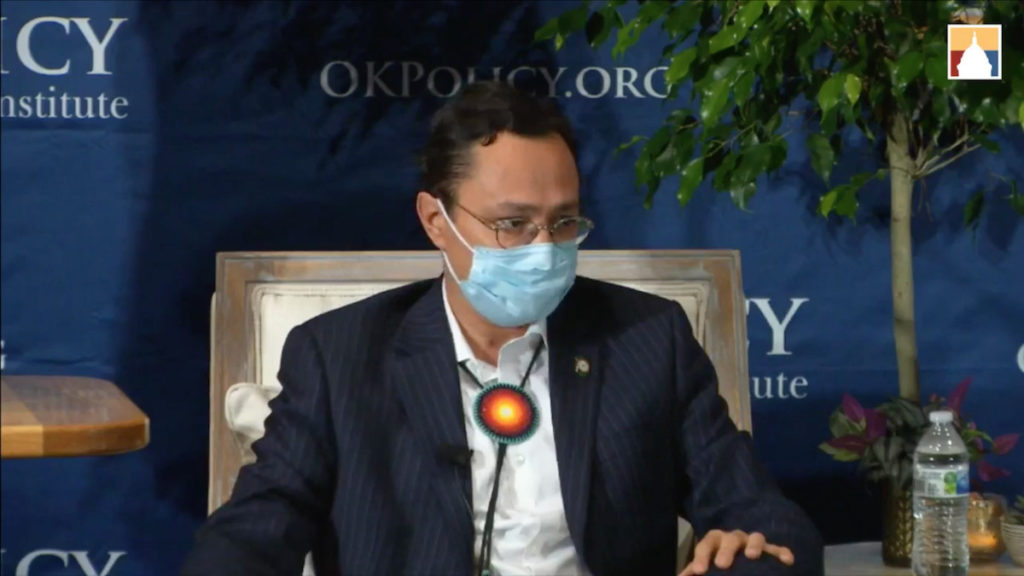
The 5-4 McGirt v Oklahoma ruling in July 2020 affirmed the Muscogee Nation as an Indian Country reservation as defined under 18 U.S.C. 1151a. The Oklahoma Court of Criminal Appeals followed with decisions stating that the SCOTUS ruling also applies to the Cherokee Nation, Choctaw Nation, Chickasaw Nation, Seminole Nation and, most recently, Quapaw Nation. This means only a tribe and the federal government — not the state — have criminal jurisdiction over major crimes that occur on reservation land involving tribal citizens.
However, while the case specifically deals with criminal jurisdiction over major crimes that occur on tribal lands, the reservation designation has numerous implications regarding civil matters, such as property rights, zoning, environmental regulations and taxation.
Stitt and members of his administration have argued otherwise, claiming that it is possible for land to be an Indian Country reservation in terms of the Major Crimes Act but not an Indian Country reservation for any other area of law. The complexity of that legal argument was acknowledged by former Attorney General Mike Hunter in August 2020 when he said that “the civil implications of McGirt are going to be the subject of litigation that could have a checkerboard sort of consequence over time.”
One of those implications stems from a 1993 U.S. Supreme Court ruling in Oklahoma Tax Commission v. Sac and Fox Nation that said members of federally recognized tribes who live and work on Indian Country land are exempt from various state and local taxes. The ruling applies for tribal citizens living and working on reservations around the country, not just in Oklahoma.
After the Supreme Court ruling in the McGirt case, most of eastern Oklahoma is reservation land, meaning the tax exemption may apply to many more tribal citizens. Hoskin acknowledged that the affirmation of reservations could cause “revenue gaps” for the state of Oklahoma.
In October 2020, the Oklahoma Tax Commission issued a report estimating a potential $72 million impact on income tax collections and a $131 million impact on sales and use tax collections. That estimate did not include consideration for Quapaw Nation citizens, who recently saw their reservation affirmed in Ottawa County.
Following the 1993 SCOTUS ruling, the state of Oklahoma has struck compacting agreements with tribes on topics like sales taxes and hunting and fishing licenses. At the Oct. 27 forum, Hoskin referenced tobacco tax compacts between the state and tribes as an example of how governments can work taxation issues out together.
“The tobacco-tax cases in the ’80s and ’90s, how were they resolved?” Hoskin asked. “They were resolved ultimately through agreement in which we share revenue.”
But striking a similar agreement on state income tax could prove more complicated. With the McGirt decision only 15 months old, tribal leaders represent a citizenry that is reluctant to support any effort seen as relinquishing the slightest bit of affirmed sovereignty. Additionally, many tribal citizens have been frustrated by Stitt’s choices of language regarding Indigenous people and his aggressive casino gambling compact negotiation attempts.
To that end, Hoskin criticized Stitt at the Oct. 27 panel for wanting more in exclusivity fees from tribal gaming operations but then signing personal and corporate income tax cuts during the 2021 legislative session that will reduce state collections by about $280 million.
“Look at one revenue stream that is a top (priority) for me — which is the gaming revenue, that is put into the state. That’s about $167 million this year. That was a record. The tax cuts last session are (nearly) twice that,” Hoskin said. “Yet, I heard the governor of the state of Oklahoma hollering, with some hysterics, that the tribes ought to be paying more.”
Oklahoma Sen. John Michael Montgomery (R-Lawton) said during the panel that “challenges” the potential impact of increased tribal exemptions for state income tax. He said the situation could cause some to question why lawmakers are funding services on reaffirmed reservations if tribal citizens who live there end up not having to remit taxes to the state.
“I think we would be interested in how do we work with the tribes on these issues and continue to make sure that the state is continuing to provide services in those areas as well, because that’s been a topic of conversation at times,” Montgomery said. “I think there’s a pretty compelling argument to be said: ‘Why are we still funding things in areas if they’re not going to be paying taxes [to fund] services for those areas?'”
On the topic of state revenue sources, Montgomery critiqued some tribal leaders for lobbying the Oklahoma Legislature to remove a cap on itemized income tax deductions for gambling losses.
“We have folks that have been advocating for gambling losses to be not subject to that itemized cap, and so the state [would then be] incurring the cost on income tax revenue when we lobby for adding those kinds of things back in,” Montgomery said.
(Editor’s note: Tres Savage contributed to this report.)









